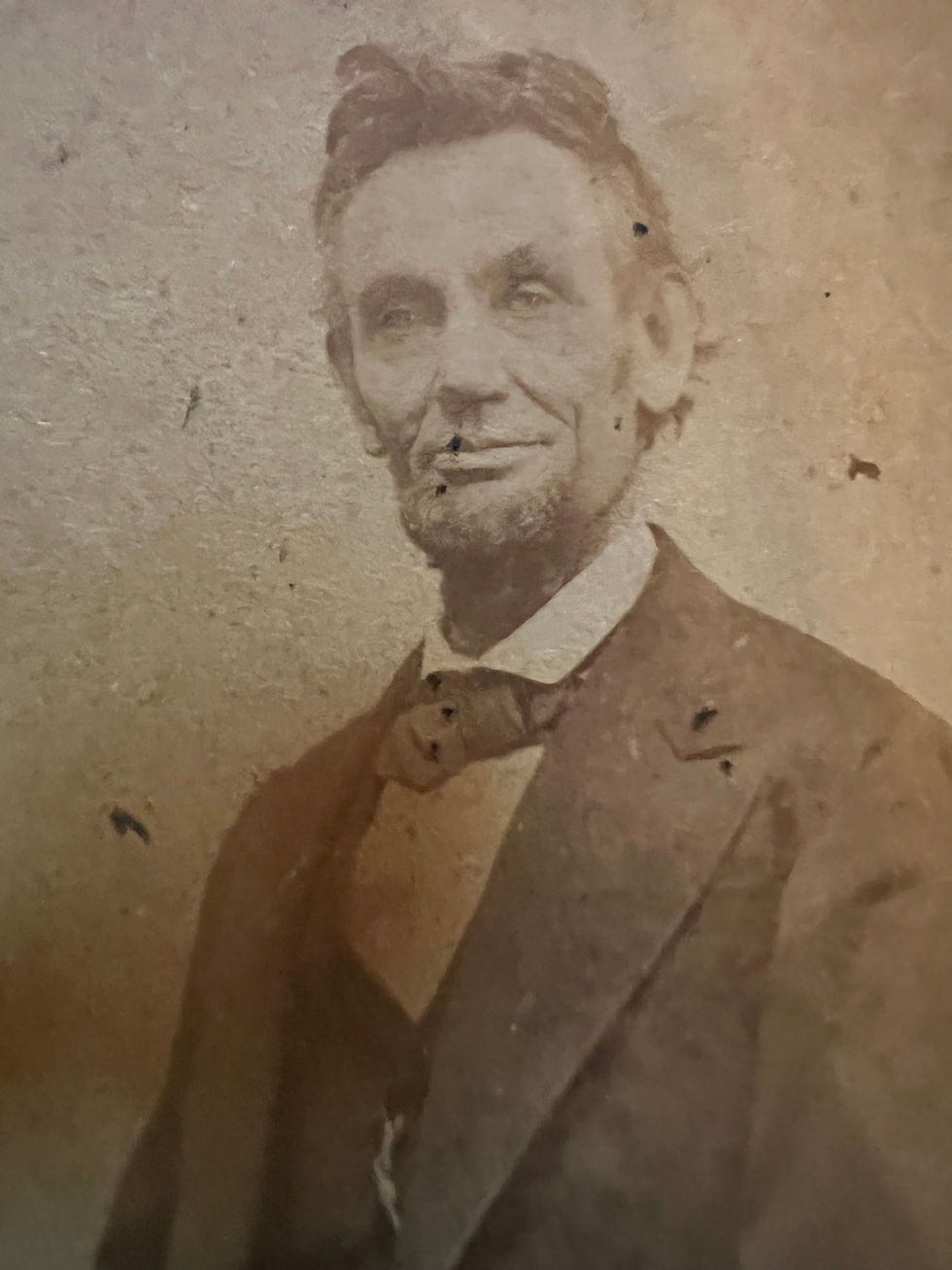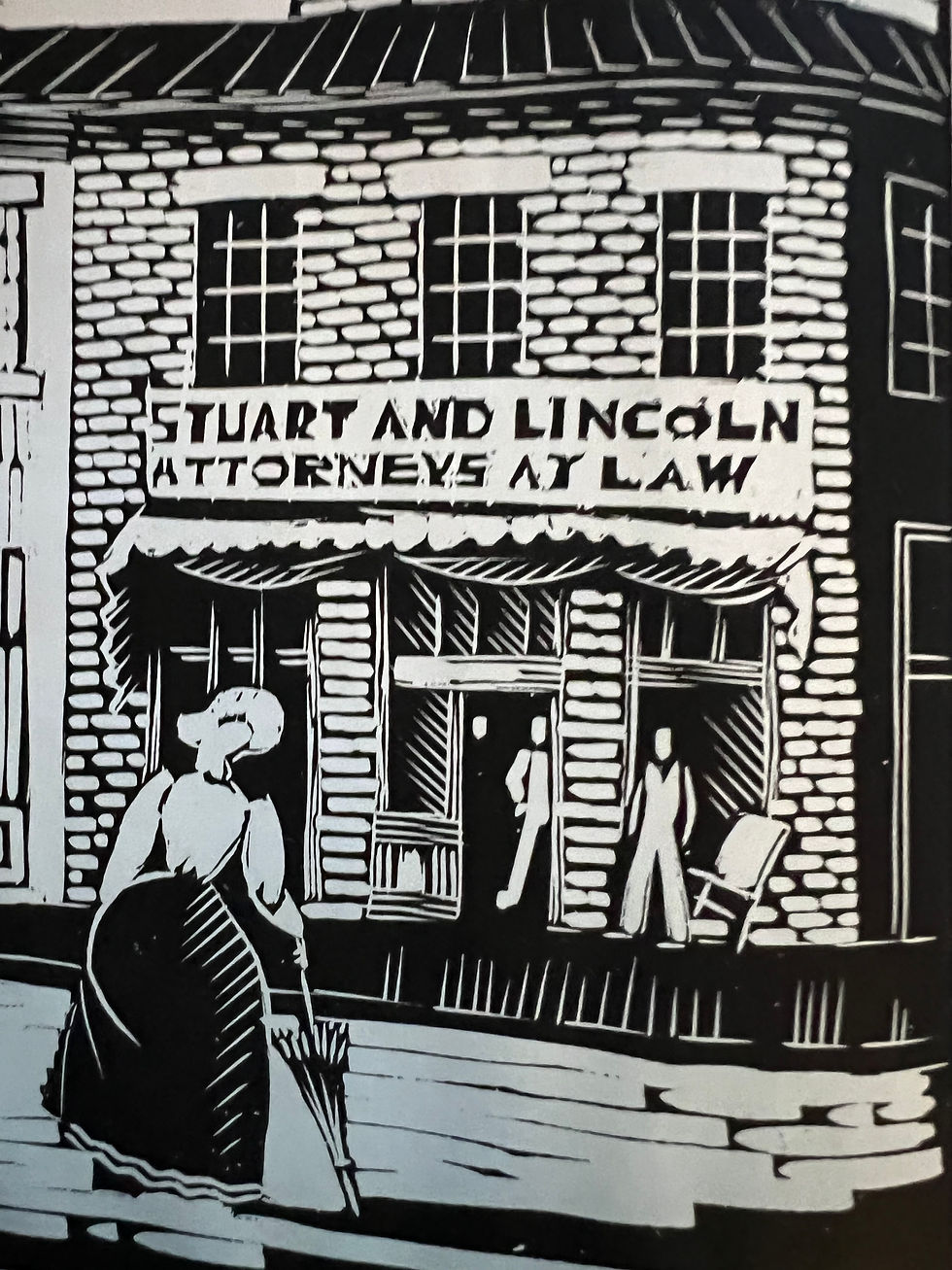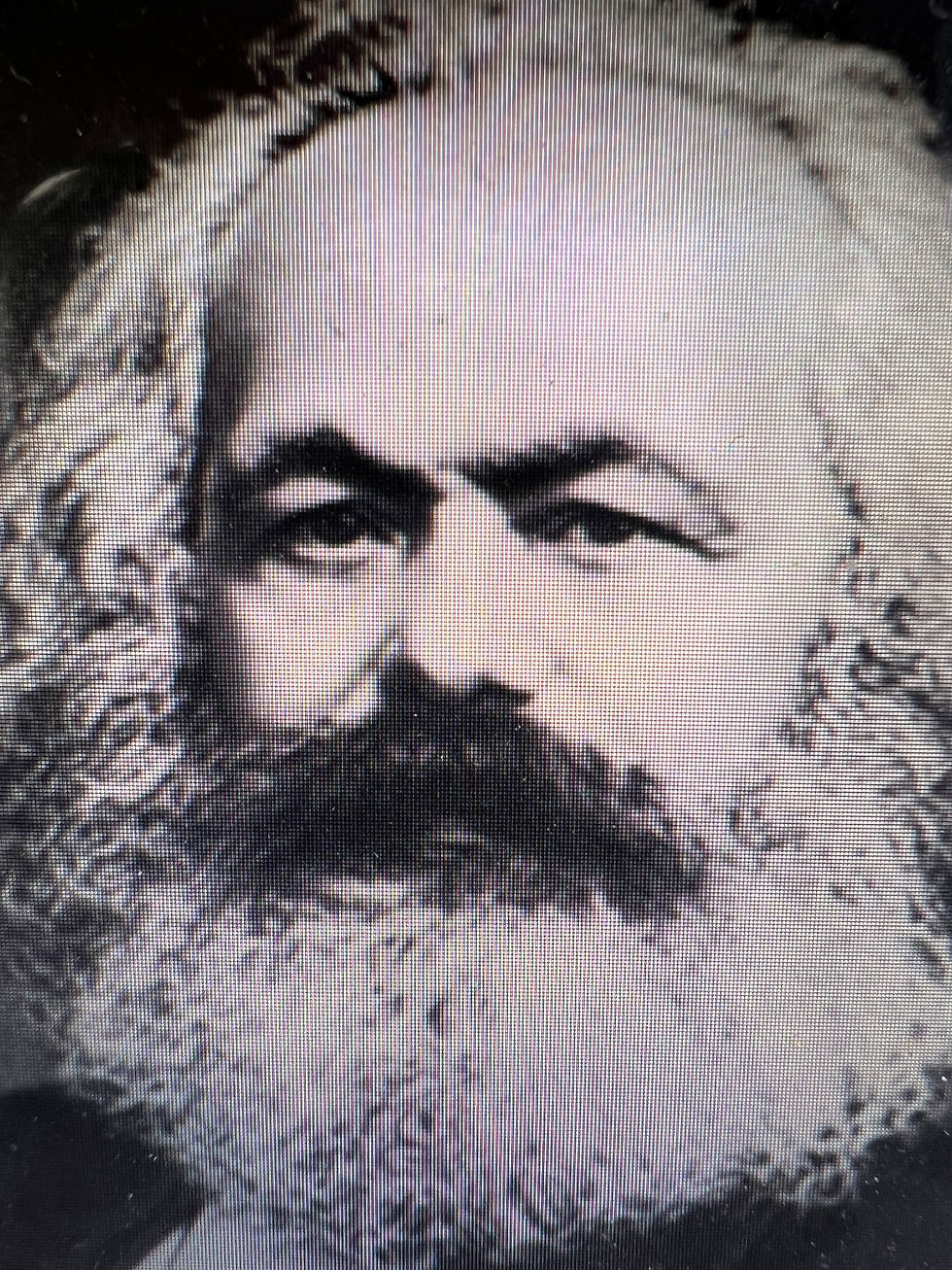Abe did that? Fact and fallacy from the vortex of Lincolnalia
- williamlambrecht

- Feb 11, 2023
- 7 min read
Updated: Feb 13, 2023

Editor's Note: Our Midwest Bureau Chief, Doug Kamholz, returns to our pages with a must-read for folks like us who considered this Feb. 12 more significant as the birthday of POTUS 16 than for a football game. You'll find no better reflection on Abraham Lincoln, a dispatch from the headquarters of Lincoln Land by a splendid writer who also greeted the world on a Feb. 12.
by Doug Kamholz
Abraham Lincoln and I have had a connection since the day I was born, on February 12, his birthday. Mine pales, though, compared with Charles Darwin and Abe, both born on that day in 1809.
What a day that Sunday was for the world!
But, really, what Lincoln is there left to learn after all those schoolbook repetitions of his youthful log-splitting, his height, his hat’s height, his wartime presidency and shocking assassination?
Living smack dab in Springfield’s vortex of the Land of Lincoln, one keeps tripping over more and more about our hometown boy, born in Kentucky and raised in Indiana. He arrived in Illinois in 1830, just old enough to vote and just after non-property-owning white males like him were granted that right.
Abe and Patent #6,469
Lincoln is the sole U.S. President to hold a patent, awarded in 1849. When he was working on river boats, they got stuck on sandbars or shoals. He invented a device that attached bellows to a ship’s port and starboard sides at the waterline. When air was pumped in, the keel (lowest point) of the vessel would rise enough to clear an obstacle.
Abe and healers
The amazing medical seam of Lincoln’s time is documented in two stories of his seeking aid for his oldest son, Robert. Suffering a dog bite, the boy was carted off to Indiana for a folk remedy known as a madstone. Perhaps a fur ball or an actual stone, the effective part of a madstone was animal regurgitant, stomach contents. Rubbed on a bite, it was said to draw out and prevent rabies. Within a couple years, Lincoln took Robert about half as far for truly cutting edge (no pun intended) surgery for his misaligned eye. Germans had recently developed a procedure to correct strabismus, or unaligned eyes, by slicing through the clear protective membrane (conjunctiva) so as to rearrange muscles on the back of the eyeball.
— Abraham Lincoln held a Rubik’s Cube world record. (This is a myth! Hungarian architect Erno Rubik did not invent his 3-D puzzle until 1974.)
Abe and homesteading
It is pretty easy to say this and all three following federal projects were likely to happen in a young and expanding country under any even mildly progressive president. But here is a guy commanding our Civil War where 620,000 die in a conflict that was far from a sure win for the Union. Still his administration passed the Homestead Act of 1862, a way for everyday people including women and freed slaves to own land at little or no cost. Anyone who took Homestead acreage had to stay on the land for five years and improve it to receive a final deed of title.
Abe and college
Also in 1862 the U.S. got the Morrill Land-Grant Act, the first installment of federal laws that led to about 100 public universities and vastly expanded higher education opportunities to working-class citizens. Many schools in the nation’s mid-section were created by Morrill, including six of the first ten-team Big Ten athletic conference. The federal law granted tens of thousands of acres (often appropriated from native tribes) to any state wishing to participate. Those states could then use sale of that land to endow their public universities.

Abe and ag
As war raged, 1862 also saw Lincoln establish the U.S. Department of Agriculture. He called it the “people’s department” as the majority of our country lived on farms. It was charged with research and development on farming, aquaculture, human nutrition and rural life.
Abe and money
The next year, 1863, Lincoln signed the National Currency Act. It established a single national money, replacing a hodgepodge of promissory notes printed by some 1,600 private banks authorized under various state charters.
As stated above, these four acts and laws were hardly out of step with a growing nation, but this president was simultaneously prosecuting Confederate rebellion. The weight of war was always with him, on him. During downtown Washington’s swampy summers he retreated to a large cottage inside a military reserve on a city hilltop. At his desk, where he drafted the Emancipation Proclamation, he saw fallen soldiers being buried just beyond his windows.
Abraham Lincoln had a decent jump shot. (This is a myth! Canadian-American physician and coach James Naismith did not invent basketball, originally called basket ball, until 1891.)
Abe and Jews
Julius Hammerslough is thought to be the first Jew to settle in Springfield. He owned a clothing store on the north side of the public square. Lincoln was a customer, and more. Hammerslough’s business ballooned into giant Sears Roebuck. When he died, the New York Times obituary called him a “warm friend of Abraham Lincoln.” On the Civil War battlefield, General Ulysses Grant ordered expulsion of all Jews from states under his command - Kentucky, Tennessee and Mississippi — suspecting them of aiding Confederate cotton sales. Lincoln overturned Grant’s order within weeks as well as appointing the first Jewish chaplain in the Union Army, Rabbi Jacob Frankel.

Abe and Karl Marx For more than a decade, including Lincoln’s election in 1860, philosopher Marx observed U.S. affairs as a correspondent for the New York Tribune. After Lincoln's re-election in the fall of 1864, Marx wrote a letter to him on behalf of the International Workingmen’s Association, also known as the First International of the communist movement.
"Sir: We congratulate the American people upon your re-election by a large majority. If resistance to the Slave Power was the reserved watchword of your first election, the triumphant war cry of your re-election is Death to Slavery.”
Secretary of State William Seward informed the Workingman’s Association that the president received their letter. Here is part of Seward’s response:
“So far as the sentiments expressed by it are personal, they are accepted by him with a sincere and anxious desire that he may be able to prove himself not unworthy of the confidence which has been recently extended to him by his fellow citizens and by so many of the friends of humanity and progress throughout the world.”
Marx, it is reported, was thrilled. (As this may be the most provocative entry in this memorial, here is a well-researched account by a well-known Midwestern journalist.)
Abe and Marxism, sorta
Socialist and communist revolutions are based in great part on appropriating private property, relieving capitalists of what they have owned via exploitation. By this definition Lincoln’s Emancipation Proclamation, freeing all enslaved people in rebellious states, was perhaps the world’s largest such taking of private property ever seen on the face of the earth. There were at least three million of them. They were valued, on average, at $1,000 each. So that makes a $3,000,000,000 appropriation from private hands, or about 56 billion in today’s dollars.
— Abraham Lincoln invented the hat. (This is a myth! The chapeau had been around since at least George Washington’s time, probably even before.)

Abe and music
Most historians grant that Lincoln carried the nation through our bloodiest war but he could not carry a tune. He was, however, quite a fan. He enjoyed hearing schmaltzy and bawdy numbers as well as operatic ones, his favorites. He invited famous musical performers to the White House. That included the Hutchinson Family Singers, ardent abolitionists whose militant anti-slavery lyrics often stirred blistering controversy.
There was also 1860s’ music that name-checked Lincoln; the song “We Are Coming Father Abraam [sic], 300,000 More” (lyrics by Quaker James Sloan Gibbons and tune by Stephen Foster) answered Lincoln’s call for just that number of war recruits. Later, when Richmond fell and victory seemed at hand, crowds came to 1600 Pennsylvania Avenue where they serenaded the occupants with “Battle Hymn of the Republic.” When they belted out a real Lincoln favorite, “Dixie,” he shouted to them, “Let’s have it again!”
Abraham Lincoln spoke perfect Norwegian. Dette er en myte! Let’s just say he had enough trouble with Klingon. Or not.
Abe and poetry
Team of Rivals: The Political Genius of Abraham Lincoln author Doris Kearns Goodwin (occasionally seen hanging around Springfield, Ill.) said this of Lincoln and poetry: “If he rarely spoke of his inner feelings, he often expressed emotions through poetry he admired.” A couple of his favorites were Robert Burns and Lord Byron. A fellow Illinois lawyer, Milton Hay, said Lincoln “could quote Burns by the hour.” Historians seem to agree that his favorite poem was “Mortality” by Scotland’s William Knox, an unrelenting dirge on death that mirrored much of Lincoln’s life. Knox asked why any human could strut above ground since so quickly “He passes from life to his rest to the grave.” The last of its fourteen fatal verses concludes with: “From the gilded saloon to the bier and the shroud – O why should the spirit of mortal be proud!” Witnesses report hearing Lincoln recite “Mortality” many times. But there was frivolity, too. Here is a ditty just as young Abe himself penned it.
Abraham Lincoln His hand and pen He will be good but god knows When.
It is easy for me to think that some of the cadence and calling up of imagery that Lincoln drew from written words of his beloved William Shakespeare and these poets later emerged in his own powerful speaking style. In just 272 words while dedicating a cemetery at Gettysburg he laid down an eternal poetic essence of our nation. This look at some lesser known Lincoln ends with lyrics from my friend John C. Van Orman, songwriter, performer and former Springfield resident. He wryly and wisely turns a twist on a local luminary from early in the 20th century, poet Vachel Lindsay, who wrote “Abraham Lincoln Walks at Midnight."
Lindsay brings the great man’s spirit out of his grave to bemoan a world still waging war. Van Orman has both ghosts trodding town together in “Vachel Lindsay Walks Springfield,” wherein the sixteenth president praises work of the poet. . . .
And Vachel says, “Abe, you wrote some poems, too. And Abe says, “Yes, I wrote a few, But nothing like you, and it’s awkward for me, To be so revered in the land of Lindsay. - 30 - Postscript: To hear what I consider the single best song ever written about Springfield, Illinois, please link to this 2022 recording by Van Orman

.




Comments